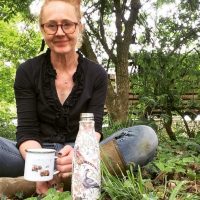Herbal Medicine: A Brief Introduction

Kate Scott, herbalist and farmer, recently presented her first webinar for us alongside holistic vet Chris Aukland. The webinar was a sell out, with uptake from farmers of all specialisms wishing to engage and learn whole farm health methods. Kate will be delivering more, and to whet your appetite, here’s a short overview of herbal medicine from her.
Kate has a unique heritage, being descended from generations of herbalists and drovers. She’s also an agricultural consultant, and currently furthering her knowledge with an MSc in Sustainable and Efficient Food Production. In her spare time she runs a small flock of grass fed Poll Dorset ewes. thedroversdaughter.com
Herbal medicine in farming
As a farmer I have always had a keen interest in self medication in ruminants. When I studied herbal medicine it gave me a much greater understanding of how the phytochemicals contained in plants work within not just the human body but within animals too. I started to understand how for example tannins help control worm burden with their astringent properties, and how plants in diverse pasture can help boost immunity within the flock or herd.
Herbal medicine has many parallels with orthodox medicine and the study includes modules not just on the plants, their botany and phytochemical content but also on the pharmacological pathways these pokey little chemicals follow in the body, just like orthodox treatments. In fact around 75% of today’s medicines have their origin in a chemical extracted from a plant! A human herbal medicine degree also covers pathology, clinical diagnosis, immunity and disease, nutrition, histology, pharmacy (making herbal medicines) and much more.
Gaining knowledge
It is important to gain knowledge around the safe use of plants before using many of them as medicines as some, for example foxglove from which digoxin is extracted can be potentially fatal, and many plants can be detrimental at the wrong dose, or say in pregnancy. I don’t want to scare you too much however, and there are many herbs that can be safely used in a farm setting both internally and externally!
As well as making them freely available in pasture there are ways of preserving and administering plants. Many herbalists use tinctures, an extract of the plant in alcohol, with animals I prefer to extract the medicinal phytochemicals using vinegar as a medium. Vinegar, especially ACV has its own researched health benefits and it seems wrong to expose animals to alcohol! Plants can be dried and added to feed, in years gone by nettle hay was commonplace and some still make it today for its nutrient rich properties. On a smaller scale medicinal plants can be dried and offered for self-selection, added to the diet, or made into an infusion, a strong tea, which can be added to water or used as a drench.
Topical & self selection
Topically herbs can be infused in oils and made into salves and balms to promote healing and act as a barrier, or made into sprays and pour on preparations.
With the inclusion of plants in pasture for self-selection and for their immune enhancing effects, the necessity to resort to treatment should be minimalised. However plants used safely can play a very important role in our natural Pharmacy!
Kate


About the author: The WHAg team love to showcase farmers and supporters who epitomise the ethos of ‘Whole Health’. We live and breathe this approach, which flows through us in farming, work, and family.

